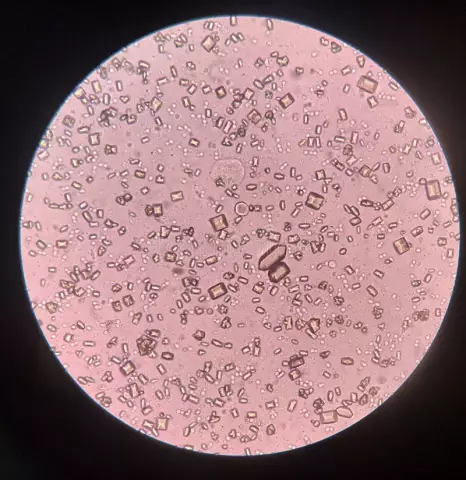- Author Rachel Wainwright wainwright@abchealthonline.com.
- Public 2023-12-15 07:39.
- Last modified 2025-11-02 20:14.
Bacterial vaginosis
Brief description of the disease

Bacterial vaginosis is an infectious disease that manifests itself as copious, foul-smelling vaginal discharge due to changes in the composition of its microflora. As a rule, bacterial vaginosis makes itself felt after the multiplication of pathogenic bacteria and a decrease in the number of beneficial microorganisms. However, the exact reasons why bacterial vaginosis occurs are not fully understood. Experts suggest that the development of infection is provoked by hormonal disorders, the presence of an intrauterine device and some antibiotics.
In bacteriological research, the following bacteria are found in the secretions: bacteroids, fusobacteria, klebsiela and gardnerella. Due to the presence of the latter, bacterial vaginosis is often called gardnerellosis.
Causes of the disease
As mentioned above, the exact causes of bacterial vaginosis are unknown. Doctors identify several factors that presumably provoke the development of the disease:
- hormonal - hormones affect the state of the vaginal microflora. It is known that bacterial vaginosis is rare among adolescent girls who have lower blood hormone levels than adult women;
- the presence of an intrauterine device - the risk of infection doubles;
- the use of a large number of antibiotics - drugs suppress the reproduction of lactobacilli and create all conditions for the development of harmful microorganisms;
- reduced immunity - treatment of bacterial vaginosis may be required after serious illnesses, as they lead to a weakening of the body's protective functions and contribute to the growth of harmful bacteria.
In recent years, it has been proven that bacterial vaginosis is not transmitted sexually, but some sexually transmitted diseases suppress the immune system and affect the microflora of the vagina, so choosing a partner should still be approached with all possible responsibility.
Bacterial vaginosis - symptoms and clinical picture
In more than 50% of reported cases, bacterial vaginosis does not manifest itself in any way. It is not surprising, therefore, that the disease is very often detected only during a routine examination by a gynecologist. In the remaining cases, the multiplication of pathogenic bacteria leads to the following consequences:
- profuse vaginal discharge with a characteristic unpleasant fish odor. Their number increases after intercourse;
- slight itching in the genital area;
- discomfort and burning during intercourse;
- pain when urinating (not common).
If left untreated, bacterial vaginosis can have serious consequences. Bacterial vaginosis in pregnant women provokes the development of complications during childbirth and the premature birth of a child, and is also one of the causes of cervical cancer. In addition, changes in the composition of the vaginal microflora affect the overall resistance of the body. It is known that in women with bacterial vaginosis, cases of infection with gonorrhea, chlamydia, papillomavirus infection and other extremely unpleasant "sores" are much more often recorded.
For men, bacterial vaginosis is completely safe. It is not sexually transmitted, and in general is considered a purely female problem. However, when diagnosed with bacterial vaginosis, treatment should begin as soon as possible, since the unpleasant smell of discharge and the discomfort during intercourse will prevent the couple from living a normal, fulfilling life.
Bacterial vaginosis in pregnant women
Bacterial vaginosis during pregnancy manifests itself after hormonal changes in the body. The disease affects the growth and development of the child, can cause premature birth and therefore needs timely treatment. The absence of unpleasant symptoms is not a reason for refusing medical care, since in this case we are talking about the life and health of the baby.
How is bacterial vaginosis treated?

The main efforts of doctors are aimed at preventing complications in bacterial vaginosis. To this end, specialists are taking action to restore normal vaginal microflora and destroy harmful bacteria. As a rule, antimicrobial pills and local agents are used for this - gels, suppositories, tablets. Here is a list of the most effective remedies:
- metronidazole, trichopolum, metrogil, flagil - inhibit the growth of bacteria, but can cause side reactions (nausea, vomiting, indigestion), so the drugs should be taken under constant medical supervision;
- clindamycin - comes in the form of vaginal suppositories or cream. Inserted into the vagina once a day, before bedtime;
- metrogil plus - inhibits the growth of bacteria and prevents the development of thrush. The drug is injected into the vagina twice a day - morning and evening.
If bacterial vaginosis is observed during pregnancy, then before taking any of the above drugs, you should consult a doctor who will advise the most gentle remedy.
After eliminating harmful bacteria, care must be taken to restore the normal microflora of the vagina. For this, probiotics are perfect - medicines containing live beneficial microorganisms. The most popular probiotics are linex, bifidumbacterin, lactobacterin.
YouTube video related to the article:
The information is generalized and provided for informational purposes only. At the first sign of illness, see your doctor. Self-medication is hazardous to health!






